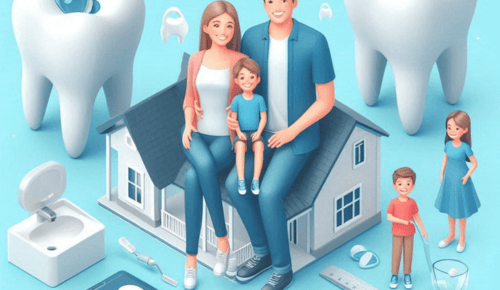Dental
25 Expert Tips for Whiter – Healthier Teeth
- Brush Twice Daily Brush your teeth in the morning and before bed using fluoride toothpaste to remove plaque and prevent cavities.
- Floss Regularly Floss at least once a day to remove food particles and plaque from between your teeth and along the gumline.
- Use Mouthwash Rinse with an antibacterial mouthwash to kill bacteria and freshen your breath after brushing and flossing.
- Limit Sugary Foods Reduce your intake of sugary snacks and beverages to prevent tooth decay and maintain overall dental health.
- Eat a Balanced Diet Include plenty of fruits, vegetables, lean proteins, and dairy products in your diet for strong, healthy teeth and gums.
- Drink Water Drink plenty of water throughout the day to rinse away food debris and neutralize acids that can harm your teeth.
- Avoid Staining Foods and Drinks Limit your consumption of coffee, tea, red wine, and dark-colored sodas to prevent tooth staining.
- Quit Smoking Quit smoking to reduce your risk of oral cancer, gum disease, and tooth discoloration caused by tobacco use.
- Chew Sugar-Free Gum Chew sugar-free gum after meals to stimulate saliva production, which helps neutralize acids and prevent cavities.
- Visit Your Dentist Regularly Schedule regular dental check-ups and cleanings every six months to detect problems early and maintain oral health.
- Consider Professional Teeth Whitening Consult your dentist about professional teeth whitening treatments to safely and effectively brighten your smile.
- Use a Whitening Toothpaste Choose a whitening toothpaste with mild abrasives and peroxide to remove surface stains and whiten teeth over time.
- Brush Your Tongue Gently brush your tongue to remove bacteria and freshen your breath as part of your daily oral hygiene routine.
- Use a Soft-Bristled Toothbrush Opt for a soft-bristled toothbrush to avoid damaging your enamel and gums while brushing.
- Practice Proper Brushing Technique Brush your teeth using gentle, circular motions for two minutes to effectively clean all surfaces of your teeth.
- Don’t Brush Too Hard Avoid brushing too vigorously, as it can wear down enamel and irritate your gums, leading to sensitivity and recession.
- Rinse with Apple Cider Vinegar Use apple cider vinegar as a natural mouthwash occasionally to help remove stains and kill bacteria.
- Try Oil Pulling Swish coconut oil or sesame oil in your mouth for 10-15 minutes daily to reduce bacteria, plaque, and bad breath.
- Use Baking Soda Brush your teeth with baking soda occasionally to help whiten teeth and neutralize acids that cause tooth decay.
- Eat Crunchy Fruits and Vegetables Munch on crunchy fruits and vegetables like apples and carrots to naturally clean your teeth and stimulate saliva production.
- Avoid Grinding Your Teeth Wear a mouthguard at night if you grind your teeth to prevent enamel wear and jaw pain.
- Drink Through a Straw Sip staining beverages like coffee and tea through a straw to minimize contact with your teeth.
- Consider Dental Sealants Ask your dentist about dental sealants, which can help protect your molars from decay by sealing out bacteria and food particles.
- Limit Acidic Foods and Drinks Reduce your consumption of acidic foods and drinks like citrus fruits and sodas to prevent enamel erosion and tooth sensitivity.
- Stay Informed Stay up to date on the latest dental health recommendations and techniques by consulting reputable sources and seeking advice from dental professionals.
Dental
The Importance Of Regular Check Ups For Your Family’s Dental Health

Regular check-ups are the cornerstone of your family’s dental health. They catch issues early, preventing pain and extra costs. When you visit a North York, Toronto dentist, you open the door to preventive care that helps maintain healthy teeth and gums. Many problems start small, often unnoticed until they become severe. Routine visits bring these to light, enabling quick fixes. Your dentist cleans teeth, removing hidden plaque that brushing misses. Check-ups also educate you and your family about proper oral habits. You learn how to brush effectively, floss thoroughly, and choose the right foods. Prioritizing these visits can protect against gum disease, cavities, and tooth decay. Remember, a simple dental visit today can save your family from discomfort tomorrow. Understanding the value of regular check-ups empowers you to take charge of your family’s dental health. Your family’s smiles are priceless, so keep them shining bright.
Benefits of Regular Dental Visits
Regular dental check-ups provide several benefits. They can prevent oral diseases that might not show symptoms until they progress. This proactive approach avoids costly procedures down the line. By regularly visiting your dentist, you also promote overall health. Poor oral health is linked to other conditions, like heart disease. Therefore, maintaining oral health contributes to a healthier life.
Early Detection Saves Time and Money
Detecting problems early saves you time and money. Treating dental issues at an early stage is often less expensive and less invasive. Consider the costs between a simple filling for a cavity versus a root canal if left untreated. Visiting the dentist regularly ensures that potential problems are managed before they escalate.
| Type of Dental Issue | Cost of Early Treatment | Cost of Delayed Treatment |
| Cavity | $50 – $150 (Filling) | $500 – $2000 (Root Canal and Crown) |
| Gum Disease | $100 – $300 (Deep Cleaning) | $1000 – $3000 (Surgery) |
Educational Component
During check-ups, dentists provide valuable education on maintaining oral health. You receive guidance on brushing and flossing techniques. You also learn about the impact of diet on your teeth. This education helps in making informed choices that benefit your family’s dental health.
Building a Relationship with Your Dentist
Regular visits help build a relationship with your dentist. This relationship fosters trust and makes it easier to discuss any concerns about your teeth or gums. A familiar dentist knows your dental history, which aids in accurate diagnosis and treatment. This personalization enhances the quality of care you receive.
Setting a Good Example for Children
Regular check-ups teach children the importance of maintaining good dental habits. They see the value you place on oral health and are more likely to follow suit. Encouraging dental visits from a young age helps children feel comfortable with dental care, setting them up for a lifetime of healthy habits.
Impact on Overall Health
Good oral health impacts overall well-being. Issues in the mouth can signal problems in other parts of the body. Gum disease is linked to diabetes and cardiovascular problems. Regular dental check-ups help monitor changes that could indicate health issues elsewhere.
Resources for Further Information
To learn more about the importance of dental health, visit the Centers for Disease Control and Prevention for detailed resources. Another valuable source is the American Dental Association, which offers a wealth of information on maintaining oral health.
By prioritizing regular dental check-ups, you invest in your family’s health and future. Your proactive approach ensures that your family enjoys strong, healthy smiles for years to come.
Dental
Choosing The Right Family Dentist: A Guide For Parents

Finding the right dentist for your family is crucial. It’s about ensuring both your comfort and health. For those seeking a dentist in Rockingham, NC, making the right choice can feel overwhelming. You want a dentist who knows how to handle kids’ fears, your concerns, and, importantly, one that fits your schedule. Oral health plays a major role in overall health. Choosing the right dentist impacts not just your teeth but also your heart and mind. You need someone who understands that every smile in your family is unique. Consider factors like location, dentist’s experience, and their ability to work with kids. You deserve a dentist who listens, understands, and treats your family with care. Each dental visit should be a step towards a healthier, happier family. Let’s ensure you find the best dental partner for your family. Your family’s smiles truly matter.
Understanding Your Family’s Needs
Every family has different dental needs. You might need regular cleanings and check-ups or specialized care for braces or cavities. Assess what your family needs most. For example, young children may need a dentist who excels in pediatric care. Adults may need a dentist who provides preventive care and screenings. Look for a dentist who offers the right services for everyone in your family. This ensures convenience and continuity of care.
Evaluating Qualifications and Experience
Ensure your dentist is qualified and experienced. Check for a valid license and any additional certifications. Some dentists pursue specialized training in areas like orthodontics or pediatric dentistry. Experience with children can make visits more enjoyable and less stressful. Research their background and ensure they have a good reputation in the community. You can find information through your state’s dental association or trusted health sources.
Convenience and Accessibility
Location and office hours matter. A conveniently located dentist makes appointments easier to schedule and attend. Consider their office hours and whether they align with your family’s schedule. Some dentists offer evening or weekend hours. This flexibility can be crucial for busy families. Check if the office is accessible for all family members, including those with disabilities.
Creating a Comfortable Environment
Dental visits should be comfortable and stress-free. A good family dentist creates a welcoming atmosphere. This helps alleviate anxiety, especially in children. Look for a dentist who communicates well and builds trust. An approachable dentist who explains procedures clearly can ease fears and make visits pleasant.
Comparing Local Dentists: A Quick View
| Dentist | Location | Services Offered | Office Hours | Specialty |
| Smile Family Dental | Rockingham, NC | General, Pediatric, Orthodontics | Mon-Fri, 9am-6pm | Pediatric Care |
| Healthy Teeth Clinic | Rockingham, NC | General, Cosmetic, Emergency | Mon-Sat, 8am-5pm | Cosmetic Dentistry |
| Bright Smiles Office | Rockingham, NC | General, Periodontics, Implants | Mon-Fri, 10am-7pm | Implants |
Reviewing Patient Feedback
Patient reviews provide insight into a dentist’s practice. Look for consistent themes in reviews. Positive feedback on professionalism, cleanliness, and patient care is a good sign. Reviews can reveal the dentist’s ability to handle children’s dental visits and any areas where they excel. Keep in mind that no practice is perfect, but overall positive feedback is reassuring.
Insurance and Payment Options
Check if the dentist accepts your insurance. Understanding coverage can save money and ensure you don’t face unexpected bills. If you don’t have insurance, ask about payment plans or discounts. Many offices offer flexible payment options to accommodate family budgets.
Trust Your Judgment
Your instincts are important. If a dentist doesn’t feel right, keep searching. Don’t hesitate to schedule a consultation to ask questions. This helps you gauge if the dentist fits your family’s needs. Your family’s comfort and health are worth the effort.
Choosing the right dentist means prioritizing your family’s smiles and well-being. By considering these factors, you can find a dedicated partner in oral health. This choice builds a foundation for healthy habits that last a lifetime. Your family deserves the best care. Let’s ensure their smiles stay bright and healthy.
Dental
The Benefits Of Combining Family And Cosmetic Dentistry

Combining family and cosmetic dentistry offers many benefits. You and your loved ones can receive comprehensive care in one place. A Briar Forest dentist can provide both routine check-ups and enhancements to improve your smile. This approach not only saves time but also builds trust with one dental team. You will benefit from a coordinated plan that addresses both health and aesthetics. Children and adults alike can experience consistent care, leading to better dental habits. With a focus on prevention and appearance, you can enjoy healthier teeth and gums. Plus, cosmetic procedures can boost your self-esteem and emotional well-being. Your dentist can guide you in creating a smile you feel proud of. This joint approach offers practical and emotional advantages. You can ensure that your whole family maintains a healthy smile while addressing personal appearance goals. This method is not just convenient. It strengthens the overall dental health of your household.
Comprehensive Care for All Ages
Having one dentist for the entire family simplifies many aspects of dental care. From young children to grandparents, everyone can benefit from services tailored to their needs. Children often require basic exams and cleanings. Adults may need more advanced procedures like fillings or crowns. Seniors might focus on maintaining the health of their remaining teeth or managing dentures. A combined approach allows each family member to receive the care they need without the hassle of juggling multiple appointments or locations.
Preventive Care and Early Detection
Routine family dentistry focuses on preventing problems before they start. Regular check-ups, cleanings, and fluoride treatments can keep teeth strong. Early detection of issues like cavities or gum disease can prevent more serious problems down the road. Cosmetic dentistry can complement this by addressing minor imperfections early, helping to avoid extensive work later. This combination can lead to fewer dental emergencies and a more relaxed visit to the dentist.
Enhancing Aesthetic Appeal
Cosmetic dentistry goes beyond simple health. It considers how teeth look and how you feel about them. Procedures such as whitening, veneers, and bonding can transform smiles. When a family dentist offers both types of care, you have a unique opportunity to enhance your appearance while maintaining oral health. This can be especially beneficial for teenagers or adults seeking a confidence boost through their smile. Your dentist’s familiarity with your family’s dental history can also lead to custom recommendations tailored specifically to your needs.
Cost-Effectiveness
Combining these services can be cost-effective. By having a single provider, you may receive bundled pricing or discounts for cosmetic procedures when paired with regular exams. Insurance coverage may also be more straightforward, offering savings on both preventive and elective procedures. You can discuss various options with your dentist to find the best plan that fits your budget without compromising on care.
Building Strong Relationships
Visiting the same dental practice for all your needs fosters a strong relationship with your dentist. You and your family become familiar with the staff, which can ease anxiety, especially in children. Trust and communication often lead to better oral health outcomes. A dentist who knows your family well can provide more personalized care and offer informed advice based on years of observation and treatment.
Data and Comparison
| Benefit | Family Dentistry | Cosmetic Dentistry |
| Target Age Group | All Ages | Teens and Adults |
| Focus | Prevention and Treatment | Appearance Enhancement |
| Cost Efficiency | Insurance Coverage | Bundled Services |
Conclusion
Combining family and cosmetic dentistry offers a balanced approach. It provides practical and emotional benefits, ensuring comprehensive care while enhancing self-esteem. By choosing a single practice for all your dental needs, you can simplify scheduling, receive personalized attention, and enjoy a healthier, more confident smile. The advantages of this combined care model mean more than convenience. They contribute to long-term health and satisfaction for your entire family.


